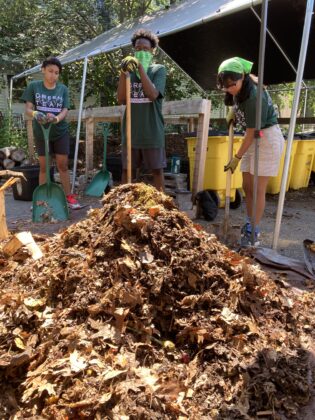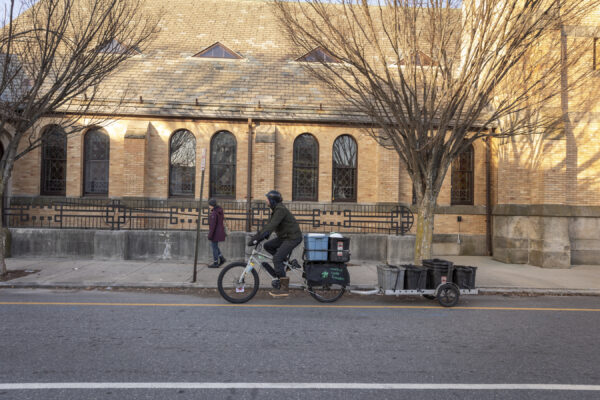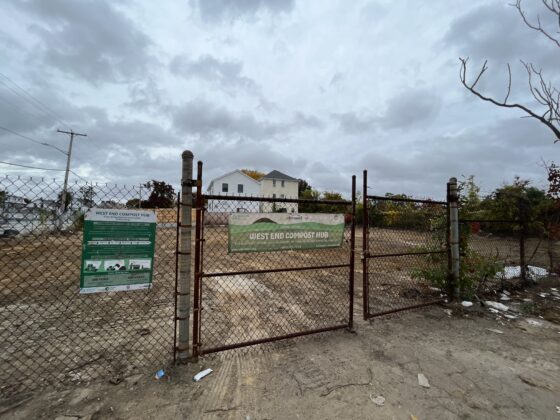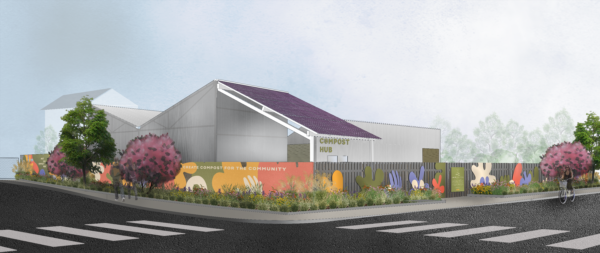Did you know that nearly a quarter of trash sent to the landfill is food waste? That’s right. Unsold, uneaten, and spoiled food takes up even more space in our landfills than single-use plastic. There are a whole host of reasons this is bad for the environment: it attracts bugs and rodents, emits a significant amount of methane, and is generally what causes the worst of the smells in our trash.
But, what if the best place to throw our food waste wasn’t in the trash?
Through their robust – and rapidly growing – community composting program, Groundwork Rhode Island (GWRI) is helping people rethink the value of food waste and making it easy to divert what we may consider trash away from the landfill into a nutrient-rich fertilizer.
In the tiny, densely populated state of Rhode Island, there is only one active landfill, which is nearing capacity, so there is an urgent need to find creative solutions for reducing food waste. GWRI has taken this mission to heart, launching a multi-pronged composting program that makes it easier for residents and businesses to be part of food waste solutions. Each year, their program, Harvest Cycle, reclaims more than 200,000 pounds of food waste and transforms as much of it as possible into nutrient-dense fertilizer.

While the benefits of composting are innumerable, unsurprisingly there are both real and perceived challenges that prevent more people from joining this effort. As part of its broader composting program, GWRI is breaking down these barriers to make the process easier and more actionable:
- Countering misconceptions and reframing residents’ relationship to waste.
In our current food system, the default is to throw food in the garbage once we don’t know what to do with it. Often, composting is thought to be logistically challenging, complicated, and messy. Through education programs and community outreach, the GWRI team is working to show folks that leftover food actually has enormous potential to be transformed to benefit individuals, the community, and the planet instead of ending up in a landfill – and it doesn’t have to be difficult. It can be repurposed into compost, shared with organizations tackling food insecurity, or even used for fuel. Through community education, GWRI lets people know that composting is an option, clarifies the process, and answers residents’ questions, helping them redefine waste, shift their mindset, and ultimately reduce the amount of food waste produced.
- Making it easy and more accessible.

A common barrier to composting, in addition to knowing that it exists in the first place, is that people don’t have space or the desire to compost on their own. So, in 2018, GWRI launched its subscription curbside compost program, Harvest Cycle, to provide residents, restaurants, and other small businesses with an accessible composting service, building off a model developed by a group of volunteers two years prior. On a weekly or bi-weekly basis, GWRI employees bike around Providence to collect Harvest Cycle members’ leftover fruit, vegetable peels, coffee grinds, and egg shells. There are also collection bins dotted in public spaces across the city where community members can drop off food scraps. Last year, GWRI collected 221,600 pounds of food waste, transforming it into over 10 cubic yards of compost that circled back to residents, local urban gardens, and community farms.
They are also getting creative about where and how they collect food scraps. Last fall, GWRI hosted the second annual Pumpkin Smash, an event for residents to bring their old Halloween pumpkins to be composted and participate firsthand in the process. This summer, the Pawtucket/Central Falls Green Team, a leadership and stewardship program for high-school-aged youth, put out new compost processing bins at a community farm located in a municipal housing complex. The youth are planning a large outreach push to encourage residents to start contributing their food waste to Harvest Cycle.
- Showcasing the benefits of the cyclical nature of food in the community.

GWRI is in the process of building a centralized commercial compost hub that will highlight the interconnected benefits of composting. The West End Compost Hub in Providence will support city-wide efforts to increase composting capacity on a revitalized vacant lot. Currently, GWRI can only process ~15% of the food waste it collects – the rest, they give to a larger-scale hauler to compost in an industrial facility. With the new Compost Hub, GWRI will be able to process a much larger portion of compost locally.
Community residents have been invited to help design the space, which will demonstrate the full compost cycle, reframe residents’ understanding of food waste, and be the site of future educational programming. Located in a mixed residential and industrial neighborhood with multiple former brownfields that have been transformed in recent years into housing, an urban farm, a community kitchen, and a farmers’ market, the West End Compost Hub will bring composting to life for many residents.
Designing the West End Compost Hub With Community Members
The West End Compost Hub is an important milestone for the composting program in Rhode Island – and GWRI is working to ensure that resident voices are integrated into every stage of this new center. With support from Groundwork USA’s Land Use Innovation Initiative, GWRI has engaged residents in the project development process by implementing a community outreach plan to inform the creation of the West End Compost Hub. GWRI has proactively brought community members into as much of the initial concept brainstorming as possible. Ella Kilpatrick Kotner, GWRI’s Harvest Cycle Coordinator, explains, “We want to do this work in a way that challenges the notion of waste processing. We want it to be a beautiful, welcoming, inviting place in the center of a community that serves residents’ needs.” Ensuring residents have a voice in the visioning process is crucial for building community support and making the space inclusive.
Staff members have spoken to residents living in the Sankofa Development – which is owned by GWRI’s partner West Elmwood Housing – adjacent to the compost site, hosted tabling events at community gardens and farmers markets, participated in community meetings, and sent mailers to spread the word about the Hub and collect feedback. Given the technical nature of designing a compost facility, GWRI focused on gathering input from community members about the features they’d like to see included and how they want to engage with the site once it’s finished. Residents shared that they want the Hub to feature local artists’ work, including murals, have educational materials to learn about composting, and offer tours to experience the composting process firsthand.

GWRI continues to spread awareness and expand local participation in the Harvest Cycle program while the West End Compost Hub is being constructed. They are building partnerships with local businesses that often have organic materials, like landscape companies, to become Harvest Cycle members; working with several public libraries to install more drop-off bins and host compost workshops and community events; incorporating composting into their youth and adult workforce development programs and training curricula; and, most importantly, constantly speaking with residents about the Hub, ensuring that momentum remains high and community members are informed, knowledgeable, and excited about the project.
As they actively search to fill the remaining funding gap for the West End Compost Hub, GWRI continues to transform community members’ understanding of waste through outreach and education, the Harvest Cycle program, and meaningful, hands-on participation in the composting process.
To learn more, visit Groundwork Rhode Island.
The Land Use Innovation Initiative, a multi-year investment in innovation, community leadership, and land revitalization, is made possible through a joint partnership between NPS-Rivers, Trails, and Conservation Assistance Program, the EPA’s Office of Brownfields and Land Revitalization, and Groundwork USA.
